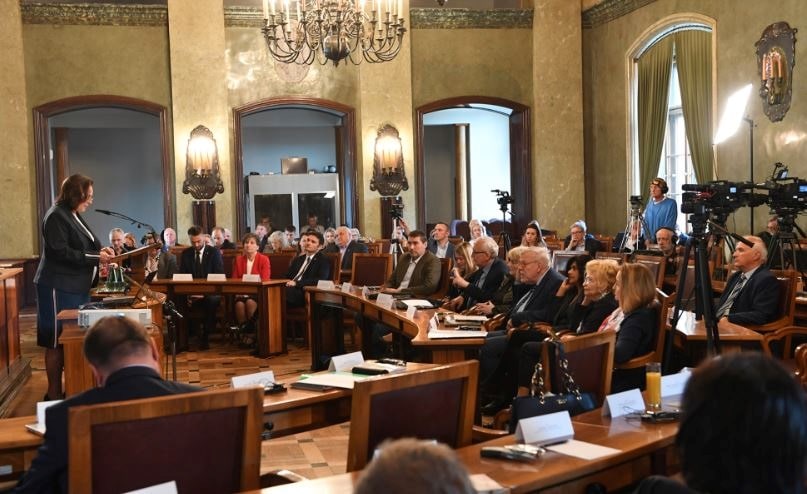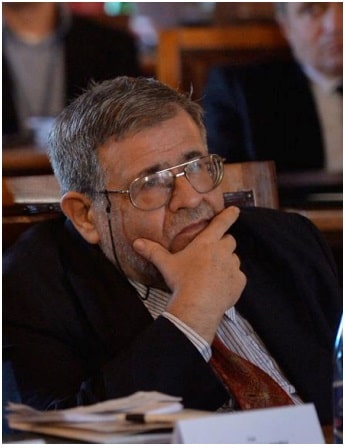Marta Patena first came to international attention when she attended a meeting five years ago in Brussels representing the City of Krakow. The meeting was convened by Member of the European Parliament Michèle Rivasi to address concerns about the dangers of electromagnetic radiation.

On returning to Kakow, year on year, Patena has conducted the Krakow Forum on Electromagnetic Radiation held in the city’s historic Wielopolski Palace built by a nobleman and military man in the mid-1500s and acquired by the city one hundred years later.
On September 23 Patena again took to the podium in Stanislaw Wyspianski council chamber – named after the writer, painter and poet of the Young Poland Movement – as an advisor to Krakow Mayor Prof. Jacek Majchrowski, and addressed the assembly explaining that the theme of the 4th Forum was Protection from Electromagnetic Environmental Pollution: The Precautionary Principle.
In the same week that Krakow discussed the health issues attached to electromagnetic radiation and implementation of the Precautionary Principal, the Vatican hosted a meeting to discuss the ethical use of digital technology, completely ignoring the the concerns of people from around the world regarding human and animal health and the environment. Two weeks earlier the Polish government in Warsaw agreed in principle with U.S. Vice President Mike Pence to deploy 5G millimeter microwave technology across the country in exchange for visas for Polish citizens to the United States.
As history tells us, once again Poland is at the forefront of international events and Patena does not shy away from the issue.
The most ethical approach to digital technology is adherence to the Precautionary Principle. According to Patena, “This is the Fourth International Conference. We had four different topics: citizens’ rights, protection of children, safe limits and today we will be talking about the Precautionary Principal. The Precautionary Principle is an ethical principle which says that if there is a probable yet not very well researched risk of radio technology, it’s better not to introduce it rather than risk potential adverse consequences. Under Polish law in the environmental protection law the Precautionary Principle is actually expressed in the environmental legislation and it goes on saying if you take on activities whose negative impact on the environment is not well recognized yet, you are obliged to adopt the Precautionary Principle and to take all the precautionary measures.”
In short, the Polish government is breaking its own laws to implement 5G technology.
Poland has consistently been a center of concern about microwave radiation and protection:
- In the 1950’s clinics were established in Russia and other Eastern European cities to treat worker suffering from a new kind of illness called ”radio wave sickness”. The patients manufactured or repaired or operated microwave equipment.
- In 1973 Poland partnered with the World Health Organization and the U.S. Department of Health and Welfare held an international symposium in Warsaw. The result was a report called “Biologic Effects and Health Hazards of Mircowave Radiation.”
- In 2008 the microwave laboratory at the Polish Military Institute of Aviation Medicine released a report stating the use of microwave-producing devices used in radiolocation, radio navigation, radio communication or radio astronomy was a “harmful occupational factor for the technical personnel being exposed to them”.
- In 2016, growing concern about microwave radiation in Krakow led Mayor Jacek Majchrowski to comment, “Protection against the harmful effects of electromagnetic fields is a hot topic. 2016 seems to be a breakthrough in this field, including thanks to the enormous commitment of the social side, thanks to activists, as well as the local government of Krakow.”

“The Precautionary Principle in practice means that that the activities aiming at safeguarding and eliminating risks to human health and the environment may only be adopted or may be adopted even if there are no scientific evidence concerning the existence,” said Patena. “The Precautionary Principle must be taken under such circumstances as it is impossible to eliminate the risk to human life and health. Such risks and threats may stem from the proposed regulations or from the fact that those regulations are failed to be implemented and so, as we want to protect the natural environment against radio frequency electromagnetic radiation we need to attach a lot of importance to the Precautionary Principle.
“In Poland we’ve had a number of discussions on that and there’s a lot of controversy between the operators and the citizens. Due to our experience in Krakow, citizens have clearly spoken their minds although they do not have reached yet what they should have been guarded for. That’s why we need to listen closely to the information coming from all over the world which confirms our worries.”
Patena listed some of the reports from around the world where governments have intervened to control the deployment of wireless technology.
Portland, Oregon, U.S.A. (24 March 2019)
– Oregon: Portland Officials Attempt To Block 5G Network Installation Over Health Risks
http://mieuxprevenir.blogspot.com/2019/03/oregon-portland-officials-attempt-to.html
Florence, Italy (22 March 2019)
– Florence will use the precautionary principle for the rollout of 5G (5G network banned)
https://www.emfsa.co.za/news/florence-will-use-the-precautionary-principle-for-the-rollout-of-5g
Rome, Italy (28 March 2019)
– Municipio XII votes against 5G trials, with others expected to follow
Other motions to Stop 5G are expected in the four regional councils, one provincial council and other municipal councils of Italy.
www.terranuova.it/News/Attualita/Un-Municipio-di-Roma-vota-contro-il-5G-cosa-fara-la-Giunta
Russia (28 March 2019)
– The Russian Ministry of Defence refuses to transfer frequencies for 5G, which effectively delays any 5G rollout there for several years.
www.vedomosti.ru/technology/articles/2019/03/28/797714-minoboroni-otkazalos-peredavat-5g
Belgium, (31 March 2019)
– The Belgian Environment Minister announces that Brussels is halting its 5G rollout plans, saying, “The people of Brussels are not guinea pigs whose health I can sell at a profit.
www.brusselstimes.com/brussels/14753/radiation-concerns-halt-brussels-5g-for-now
Germany (4 April 2019)
– Germans sign a petition en masse to force the German Bundestag to debate 5G.
Netherlands (4 April 2019)
– Members of Parliament in the Netherlands insist that radiation research must be carried out before any approval of the 5G network.
www.ad.nl/tech/kamer-wil-eerst-stralingsonderzoek-dan-pas-5g-netwerk~ab567cd6/
San Francisco, California, U.S. A. (5 April 2019)
– California Supreme Court Justices unanimously uphold a 2011 San Francisco ordinance requiring telecommunications companies to get permits before placing antennas on city infrastructure.
zero5g.com/2019/california-supreme-court-sides-with-cities-in-small-cell-faceoff/
Switzerland (9-10 April 2019)
– The Canton of Vaud adopts a resolution calling for a moratorium on 5G antennas until the publication this summer of a report on 5G by the Swiss Federal Office for the Environment.
takebackyourpower.net/5g-vaud-switzerland-adopts-moratorium/
– Geneva adopts a motion for a moratorium on 5G, calling on the Council of State to request WHO to monitor independent scientific studies to determine the harmful effects of 5G.
www.letemps.ch/suisse/geneve-adopte-une-motion-un-moratoire-5g
Patena also cited the work of long-time United Nations staff member Claire Edwards who claims that ““5G is global health catastrophe” The United Nations regulary promotes wireless technology through its International Telecommunications Union. In a January 2019 article, Edwards explained that she became electromagnetically hypersensitive while working for the U.N. in Vienna. When she took her concerns to the UN Secretary-General, António Guterres, a physicist and electrical engineer, he claimed to know nothing about the dangers of electromagnetic radiation. Patena paraphrased Edwards as saying, “5G is beginning to look like an ‘unwanted orphan’. Whoever listens to the truth about 5G is trying to avoid it. The domino effect is in full swing and that many cities and countries are now launching 5G”.
The situation in Poland is complex. Whether by design or through incompetence, the Polish parliament voted on 5G before receiving a commissioned white paper. The report from the Ministry of Communication on the 5G environmental impact, according to Patena, “which was by the drafted by the institute in Lodz was kept secret and it was only released after the voting in the parliament. The upper chamber of the parliament only put forward some editorial amendments and the president signed signed the new law on the 6th of September.”
“In this way we are only the second country in the world, just after South Korea,” reported Patena, “to implement 5G technology. The Polish government wants to make a showcase of it. We simply want to be better than other countries, but those countries would never want to compete at that pace. They are adopting the wait and see position. They don’t want to be the guinea pigs themselves. There is no scientific evidence to confirm that 5G is safe. There is no research to confirm that any of the existing networks are safe – 2G, 3G or 4G. SInce we moved from our landlines into Smart Phones it is us, the human beings, that are now causing high emissions of electromagnetic radiation. Of course, in our natural environment we are still exposed to radiation but none of us would believe that its safe to stay out in x-rays or a solar ray for a number of hours non-stop.”

The issue of electromagnetic hypersensitivity is another aspect of how low levels of radiation affect the population at large. In Ireland, those claiming to be electrosensitive are given medication to alleviate the symptoms or a referral to a psychiatrist. In the U.K. one unfortunate hypersensitive was forced into a psychiatric unit by social services after visiting her doctor. These victims are merely the first to suffer, according to Patena, with the rest to eventually follow. In Poland the new laws are unsafe for two reasons, said Patena, “First of all, the Polish state is not taking care of the people who are sensitive to radiation and in this way those people are excluded… if the entire population is exposed to electromagnetic radiation, the entire population will suffer very soon.”
Another issue relating to electromagnetic radiation is the conflict between experts and scientists regarding the perceived dangers. Referring to the Polish government’s white paper, Patena turn to page 66 of the report and noted: “…we read as follows: ‘We should take into account that sometimes even in scientific publications, we have non-objective interpretations of the results or whatever they publish is the experiments that are carried out with according to a wrong methodology.’ So, of course, we have many doubts. There are some professors that would not be willing to do what the politicians require them to do.”
Patena specifically referred to the avuncular Prof. dr hab. Wlodzimierz Klonowski, Ph.ed, Dr.Sc., Biomedical Physics, of the Nalecz Institute of Biocybernetics & Biomedical Engineering, Polish Academy of Sciences, Warsaw, Poland. who rounded on the authors of the Jagellonian University in Krakow ethical obligation and, questioned both the science supporting the report as well as its conclusions. “As I am a scientist and I am bound by the ethical code, I’d like to express my rage and protest against the report,” said Klonowski. “This report.” said Patena, “has been up-loaded to the website of the Ministry and its full of facts that are not true, half truths and if a non-specialist audience reads this report on the Ministry pages, people are going to believe that these theses are actually true.”
Citing a second article from a professor at Lodz Polytechnical University, Patena explained that “Scientists have to bear ethical obligation and authority. Well, in the context of financial sources coming from international corporations, we may arrive at a situation of conflict of interests because large telecoms operators are very happy to fund those scientific researchers support their concepts. We need to look at well researched and not-so-well researched health consequences of electromagnetic radiation. We must treat it as an absolute priority.”
Ending her summary of the current state of affairs regarding the ever increasing reliance of wireless technology and specifically 5G, Patena cited the huge cost the public will have to pay as much as 200 billion Polish zloties (more than €46 billion euros or U.S. $50 billion.) for the change-over to 5G. “Poles will pay through the nose for the 5G network. It’s very important that we come up with a proper cost comparison,” noted Patena, “because there’s a number of important costs charged to the user. If we use the 5G network, the user will have to purchase a new piece of equipment that will not come cheap. According to the main office for statistics in 2017, the Polish population had 52.9 million active SIM cards. If Poles replace just half of those SIM cards when they buy the new 5G Smart Phones ths will give us 26.5 new devices/ Even if you pay around 3,000 zloties for these new Smart Phones, in the final analysis, this will come in to billions of zloties paid to the telecoms operators and even more so because we have to count the subscription fees the telecoms are charging.”
When former head of the Federal Communications Commission Tom Wheeler unleashed 5G in June 2016 without considering the health impacts of the technology he used a phrase – “That’s damn important.” To the telecoms industry.
The same can be said for Patena’s damn important address in Krakow. For Poland. For Europe. For the rest of the world.
– John Weigel
